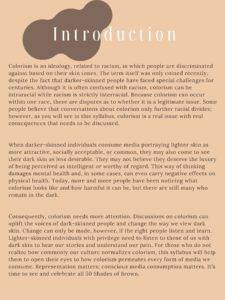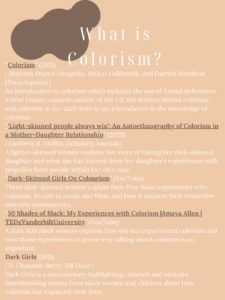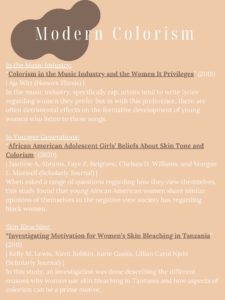Colorism Syllabus

Moving beyond the syllabus. What now?
Now that you have surveyed printed, audio, and visual materials related to colorism, you may be asking what to do now with all this information. In the modern day, we are constantly faced with new -isms, and when presented with so much information all at once, it can be overwhelming and difficult to decide what to do next. In the past, colorism was not taken seriously because of the disregard for black female concerns. Many ignored their cries for justice when it came to colorism and labeled them as being dramatic, attention seekers, or crazy. However, once you have taken in the information, there are some steps you can take to aid in moving the world into a progressive society and validating the emotions of dark-skinned individuals.
Continue to educate yourself. The world is constantly changing, and new information and data about colorism are constantly being put out. Since you have a foundation to what colorism is, you can better recognize it in society.
Donate when and where you can. If you have the funds to donate, that is always a huge help to minority communities. There are charities set up specifically to aid black and brown marginalized communities, whether it be for therapies or homeless shelters. I have provided links below.
Educate others. There are still so many people who are in the dark about this topic; therefore, educate your friends, families, kids, and spouses. Calling out colorists forces you to bring about change and forces the colorist to begin to think about their actions.
Lastly, it is important to take care of your own mental health. While educating and advocating for others is a good thing, it will be no use if it is tearing you apart. I hope you take what you learned from this syllabus, use it to make a positive impact in your world, and continue to celebrate all 50 Shades of Brown.









